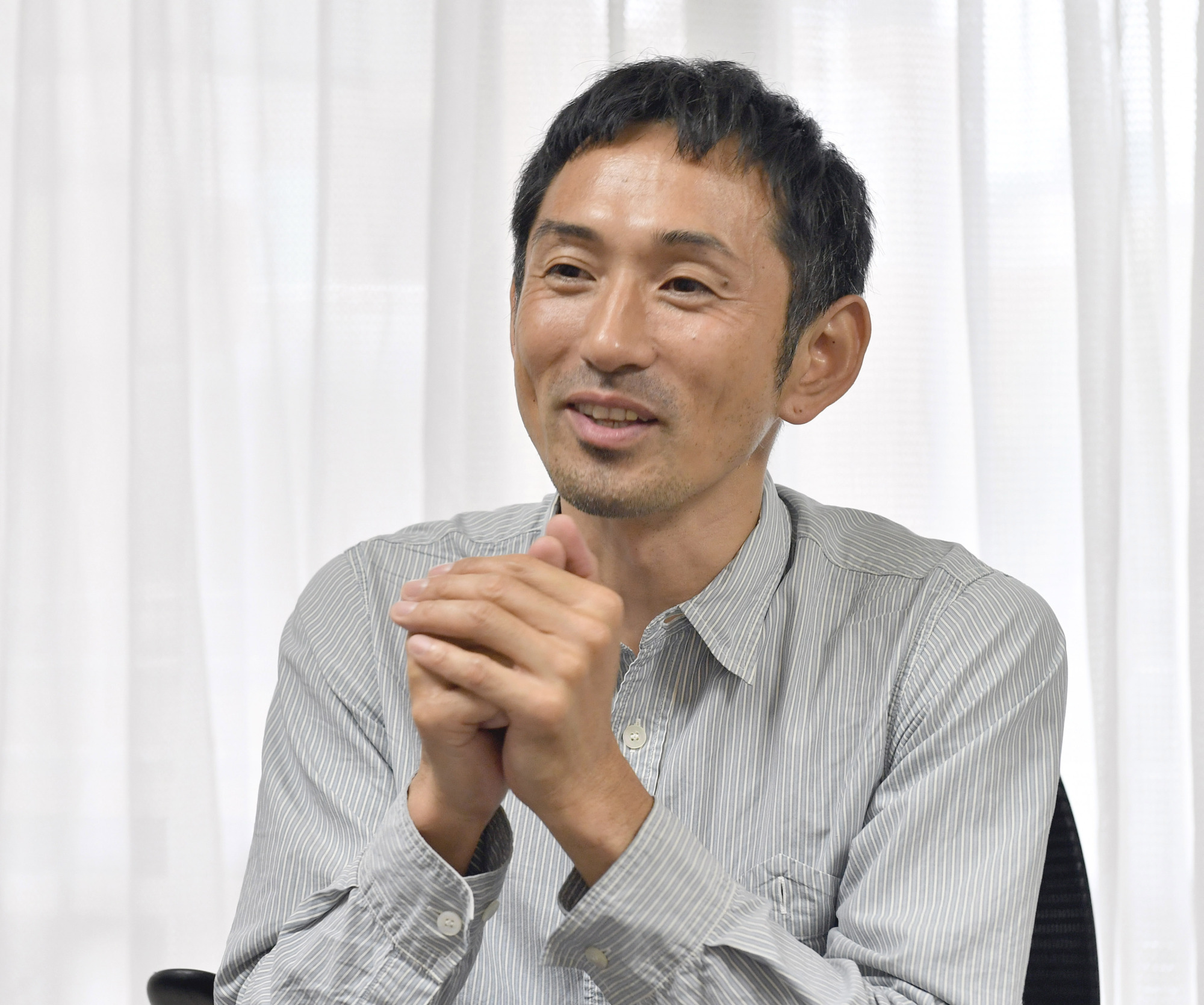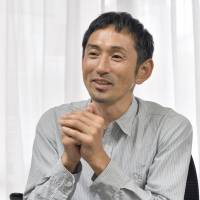Dai Tamesue, a former track star who made Japan's Olympic team for the 2000 Sydney Games, the 2004 Athens Games and the 2008 Beijing Games, has experienced the highest levels of competition in Japan, the United States and elsewhere.
Now active as a TV commentator, Tamesue, who nabbed a pair of bronze medals in the 400-meter hurdles at the 2001 and 2005 IAAF World Championships, has also developed a business aimed at supporting current and former athletes in Japan.
The 40-year-old Hiroshima native sat down with The Japan Times in his office in Tokyo last week to discuss some of the current big issues in Japanese sports.
The Japan Times: Let's start with the controversy surrounding the illegal tackle a Nihon University football player made on a Kwansei Gakuin University quarterback on May 6. The play is significant in that it was made with the intention of injuring the opposing player.
Tamesue: The bottom line is this play broke the so-called "gentlemen's agreement" that prohibits things like this from happening. Avoiding dangerous plays is very important, especially in contact sports. The player made the illegal play because he was ordered to do it. That is hardly understandable for people outside Japan.
The Nihon University coaches allegedly used their power and scare tactics in order to control the team.
The problem is why that kind of method is used in Japan. It's hard to understand for people who have experienced sports in other countries. The top-down structure has been significant in Japanese sports culture and coaches use it to control athletes.
What surprised me when I joined an American track and field team (few years back), a teammate told one of our coaches "you're fired." In their mind, it's the athletes who hire the coaches and when the coaches fail to help the athletes improve, they will be let go. It was shocking to me.
The relationship based on (coaching) contracts keeps power harassment from occurring. The athletes and coaches just part ways when they do not get satisfying outcomes. But in Japan, coaches don't make much money and most of the athletes aren't professional. These circumstances create a situation where coaches control athletes through power and scare tactics. This is another unique aspect of Japanese sports culture.
There are multiple reports of coaching using violence, not only in the Nihon University case, but at other schools.
I wouldn't say it's common. It should be very rare. But when you see cases in which violence is used, the coaches had similar experiences when they were athletes. They learn to use violence from their coaches and follow the way their coaches taught them.
One of the reasons it happens is Japanese sports are not very open. Many athletics want to be involved in their sports even after they retire. Their choices. Their choices are to be coaches or join the association of the sport.
In either case, they'll be surrounded by former athletes or coaches of those sports. So athletes don't want to defy their seniors because it would affect their lives after retirement. When it continues for years, their own rules and "common sense," which are far different from the ones effective in the outside world, are established. Under these circumstances, there is a chance power harassment occurs.
Instead of only the defensive player being punished, the Nihon University football program was suspended. Do you think this is right?
In Japan, individuals are sacrificed for the team and the team requires the individuals to sacrifice themselves to win the championship. Japanese want to be united. In other countries, somebody stands up as the leader to guide the team, but in many cases in Japan, this doesn't happen.
Japanese are taught one mistake affects others. It leads to a sense of collective responsibility. I personally feel this collective responsibility has a negative impact on sports in some cases, and athletes sometimes are even responsible for what happens off the field. I do not agree with this. In the Nihon University case, the coaches and the defensive player should be suspended. Other players might be to blame for not stopping the player's act, but it is not a big deal. I am against the suspension for the other players.
Recently there have been power harassment issues in women's wrestling and now this happened in football. Why do these problems keep happening? Is it related to Japan's sports traditions or its structure?
I think it is related to tradition. Japanese sports are a different world. You are asked to focus only on your sports. This is different from the systems in U.S. colleges, where students are forced to spend a certain time studying and are given the opportunity to do something else that can open their minds to the world outside of sports.
But in Japan, concentrating on one thing is welcome. For example, I often used to be told to not waste my time studying. I was told to use that time for practice. This culture is still widespread and sometimes causes power harassment to occur.
Harassment and violence often happen in the inside world of clubs or teams. How does this get solved?
I always recommend organizing bodies have board members from outside and disclose information to the outside.
Many of the organizing bodies have been changing, but not as quick as people have hoped.
Organizations often need pressure from the outside, as you saw happen in basketball a few years ago. At that time, there was a threat Japan would be ruled out of international competition unless it had a united basketball league. You sometime need outside pressure to get better.
Will the to-be-established Japanese college athletics body (similar to the United States' NCAA) help solve those issues?
We need that kind of organizing body, but there are many unregulated organizations in Japan. The organizing body needs really strong authority in order to unite and control them. One successful example here is J. League, which is given the authority to set regulations and deliver them to local clubs.
The (Japan) Sports Agency, the IOC, or the NCAA emphasizes "athletes first," but I think there are two aspects of the word. One is putting the priority on athletes whose goal is winning.
The other is caring about athletes' lives. You live a long time, and playing time is very limited. You have plenty of time and various other parts of life after retirement. Taking care of the athletes' lives after retirement is another concept of athletes first.
It is difficult for athletes to find a job after retirement. How are they helped?
I have been working on a project focused on supporting athletes in their second career. The athletes should have a vision of their own lives even before retirement.
They are in a better situation than other people because they have more time to think about the plans for their second careers.
You don't have to play your sport the whole day. You have time to spare because you only actually work out a few hours a day. It is important to use that time for your second career. If you spend 10 years doing nothing, you are to blame for the lost years.
In the U.S., for example, an athlete is encouraged to play multiple sports. What do you think about this?
It's great. I think an athlete should do at least two or three sports. My junior high school teacher made me do throwing and jumping events as well as short track. That helped me improve my performance on the track.
Many athletes want to play multiple sports. But the sectionalism of each sport prevents this from happening. A lot of coaches still believe athletes need to concentrate on one sport throughout the year to improve.
Japanese probably tend to put too much incentive on winning. The winner and winning coaches tend to be honored too much. We should pay more attention to the value of training athletes in the long term.
For example, take a school that often produces clubs or athletes that clinch national championships. Few Olympians come from this kind of school. The system to produce champions in three years is much different from the one to train Olympians in a 10-year program.
Training athletes over the long term should earn more credit in Japan. To let young kids do multiple sports helps them learn how various muscles move. The fundamentals help improve your performance in your 20s when you reach the peak of your athletic ability.
What do you think Japan needs to do to protect athletes from harassment?
One organization I think Japanese college sports should have is a players' association that encompasses all the sports. The athletes should be able to easily access it and get support or advice from the lawyers the players association hires.
If there had been one, the Nihon University defensive player would have had a place where he could go for help, and the incident could have been avoided.



















With your current subscription plan you can comment on stories. However, before writing your first comment, please create a display name in the Profile section of your subscriber account page.